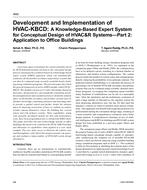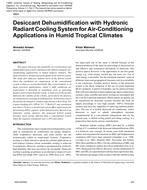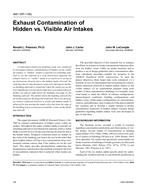Examines the effects of a year-round hot and humid climate regime on the acceptability of ambient temperatures that are warmer than preferred. Ninety-eight college-age subjects who were naturally acclimatised to Singapore’s equatorial atmospheric environment were studied in 10 experiments. The research design consisted of two humidity levels (70% and 35% RH) and five temperatures falling on the warm side of the current ISO standard’s predicted neutrality. Subjects were sedentary throughout the three-hour experiments and clothed in a standard uniform. Thermal sensation, comfort, and acceptability responses were recorded every 30 minutes. Using a 20% dissatisfaction criterion, the upper limit of the acceptable comfort zone at 70% RH was established at 27.6 deg C, while the corresponding value at 35% RH was 27.9 deg C. These results were in line with the predictions of the current international comfort standard (ISO 1984), despite the fact that the empirical bases of the standard, were subjects from much colder climates than Singapore’s (northern Europe and the United States). However, the current climate chamber results differ considerably from previously reported field study results.
KEYWORDS: thermal comfort, tropics, climate chambers, experiment, Singapore, ambient temperature, human body, physiology, relative humidity, temperature.
Citation: Symposium, ASHRAE Transactions, vol.97, Pt. 1, New York 1991
Product Details
- Published:
- 1991
- Number of Pages:
- 7
- File Size:
- 1 file , 940 KB
- Product Code(s):
- D-18625


